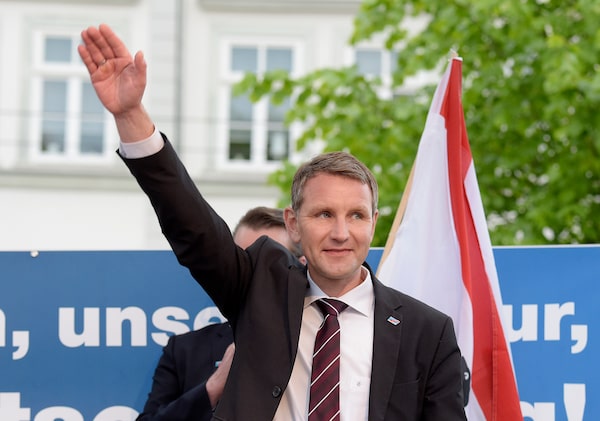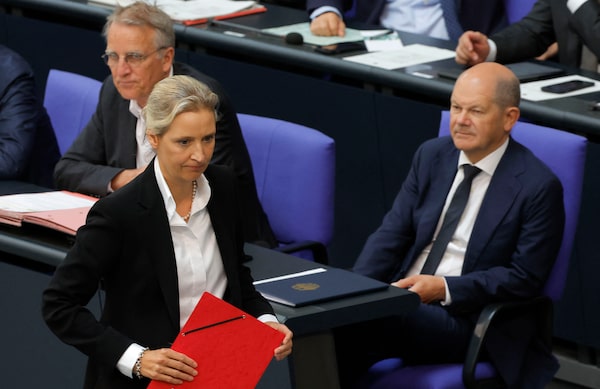Supporters of Alternative for Germany (AfD) party sing the national anthem during a protest against the government in Berlin in 2022.CHRISTIAN MANG/Reuters
Sadiya Ansari is a Pakistani-Canadian journalist based in Berlin.
The summer tradition of relaxing at an open-air public pool in Germany is sacred. Hardy swims, languid afternoons sprawled on wide lawns, and the option to zip to a well-stocked café for a beer: For a century, “Freibad” culture has been a staple of urban German life when the temperatures rise.
So earlier this summer, when a series of brawls and assaults broke out at Columbiabad, a swimming pool in Berlin’s historically immigrant Neukölln neighbourhood, it quickly sparked a debate on policing public spaces. For some in federal politics, however, the discourse became about a much more existential question: Who belongs in Germany?
The response from Alternative for Germany (AfD) – the far-right and anti-immigrant party that has amassed alarming support in the country – was predictable enough. But comments from the Christian Democratic Party (CDU), the major centre-right party that serves as the primary federal opposition to Chancellor Olaf Scholz’s government, were more surprising. “Families who cannot afford a vacation or a pool in their own backyard have to watch young men, often with a migration background, become violent in the open-air swimming pool,” said Carsten Linnemann, the CDU’s secretary-general.
This isn’t what you might expect to hear from the party once led by Angela Merkel, perhaps best known outside Germany for opening the country’s borders to more than one million refugees in 2015. But it’s part of an alarming phenomenon: As the AfD becomes increasingly popular, so too has its rhetoric in the broader political mainstream.
The AfD has become known, even beyond Germany’s borders, for its bald xenophobia. It has proposed closing the European Union’s external borders, doing away with the asylum system, and has made inflammatory statements, such as AfD deputy leader Beatrix von Storch’s 2017 assertion that “Islam does not belong to Germany.”
Much has been made of the possibility that the AfD could rise to political power in the future. After a breakthrough federal election in 2017 that saw the AfD enter the Bundestag for the first time as the third-largest party with 13 per cent of the popular vote, the party has surged to second place as it polls as high as 21 per cent nationally, with some state elections looming next year. But what is more alarming is how much influence the AfD has already accrued. Mr. Linneman’s comments about the pool aren’t the only recent example. Just last month, CDU Leader Friedrich Merz described his party as an “Alternative for Germany – with substance,” and called to limit immigration. And this normalization has been under way for years; for instance, just five months after Ms. von Storch rebuked Islam’s place in Germany, her statement was repeated, word for word, by the CDU’s interior minister at the time.
I first reported on the AfD in 2019, when the party’s popularity coincided with a rash of extreme right-wing violence in the country. Its influence stagnated for a couple years, and a complacency seemed to set in as its support dipped in the 2021 election to around 10 per cent, reducing its seat count even as it maintained popularity in the former East German states of Saxony and Thuringia. But this summer, the party has enjoyed a surge in popularity. In late June, the party even won a district council election for the first time, in the county of Sonneberg, in Thuringia. While AfD members have been elected to state and federal parliaments, Robert Sesselmann will now be the first to govern a district in a job akin to that of a mayor.
What’s happening in Germany echoes the rise of Donald Trump in the U.S., the populist forces that led to Brexit, and the far-right in Europe, including in Italy and Sweden. But what makes this situation unique is the country’s ugly history with a nationalist party that wrought conflict and genocide across the continent, and how the aftermath led to postwar institutions designed to avoid exactly this situation.
Somehow, Germany finds itself contending with a party with decidedly undemocratic ideas being democratically elected. The AfD’s growing popularity makes it a threat not only to those targeted by its policies, but to democracy itself. And what’s perhaps more terrifying is that even without any real governing power, the party has already managed to influence policy. How much longer can its growth be ignored?
A supporter of the Alternative for Germany (AfD) party does a Hitler salute during a protest against the government, amid skyrocketing energy prices, in Berlin, Germany, October 8, 2022.CHRISTIAN MANG/Reuters
After the Second World War, German society cultivated a “culture of remembrance” to recognize what led to the rise of fascism under the Nazis, and ultimately, the horrors of the Holocaust through active engagement with monuments, historical sites such as concentration camps, and educational programs. That thinking also formed Germany’s postwar institutions, which were designed to support a “defensive democracy” – one that could thwart efforts to subvert existing institutions, in response to Adolf Hitler becoming chancellor by democratic means. The postwar constitution, referred to as the Basic Law, puts human dignity above all. The domestic intelligence agency is called the Office for the Protection of the Constitution (BfV), and is described as “an early warning system.” It has broad powers to monitor political movements and parties that threaten elements that hold up the democratic order, including human rights, free elections and independent courts. And if evidence collected by the agency mounts against a party, the Federal Constitutional Court can ban it.
The AfD is now testing the effectiveness of these mechanisms. But it wasn’t conceived as an anti-democratic force: The party was founded in 2013 near the height of Europe’s debt crisis by a euroskeptic economics professor and former journalists. But it wound up attracting “protest voters” who didn’t see themselves reflected in traditional political parties. The AfD quickly moved farther right, its platform transforming into an anti-refugee screed after then-chancellor Ms. Merkel opened the borders to more than one million Syrians and Afghans. That Islamophobia and xenophobia – among other troubling developments – led to the departure of AfD founder Bernd Lucke in 2015. None of that stopped its electoral rise.
“This is the first time in postwar German history that an extremist right-wing party is successful and sitting in the federal parliament,” said historian Norbert Frei, a professor at the University of Jena, who co-wrote a book on the rise of the AfD and its connection to historical nationalist movements. He told me he’s been watching developments with dismay ever since: “There is no tipping point for me any more – the problem rises and rises.”
What has limited that rise is a “firewall” agreement between Germany’s major political parties to reject collaborating with the AfD. This effort to isolate the party is significant in a coalition-oriented parliamentary system where agreements with smaller parties can mean the difference between government and opposition. But in July, federal CDU Leader Mr. Merz chiselled some cracks in the wall, saying that his party would be open to working with the AfD at the local level. A backlash led Mr. Merz into a bumbling retreat, but as the party gains traction across the country, it’s unclear how much longer this firewall will hold.
The party’s watershed win in Sonneberg, where Mr. Sesselmann does not need a coalition to govern, has striking echoes for Prof. Frei. Thuringia is where the first Nazi official was elevated to a position of power, when Wilhelm Frick became a minister in 1930. The largely rural state is now home to some of the more radical members of the AfD, including Björn Höcke, the party’s leader there.

There’s no shortage of evidence of extreme right-wing views held by Björn Höcke, Thuringia’s regional leader of Germany’s far-right AfD party.Jens Meyer/The Associated Press
There’s no shortage of evidence of extreme right-wing views held by Mr. Höcke, a former history teacher. In 2017, he challenged Germany’s remembrance culture, calling the Berlin site dedicated to honouring the millions of Jewish people killed in the Holocaust a “monument of shame.” The response by civil society was swift – yet a regional AfD arbitration panel did not find his actions “harmful to the party.” Then, in 2019, the public broadcaster ZDF took sentences from Mr. Höcke’s book and asked AfD members to guess whether they came from their colleague or from Hitler’s Mein Kampf; many were tripped up. And Mr. Höcke was charged in June for using a Nazi Stormtrooper slogan – “Alles für Deutschland,” meaning “everything for Germany” – in a 2021 speech in the city of Merseburg.
While Prof. Frei recognizes not everyone who voted for Mr. Sesselmann endorses Mr. Höcke’s radical views, he finds it troubling they could simply ignore them. “This is something which I find rather frightening – that there is no political or moral inhibition against voting for the AfD given that there is a fascist leader of the state,” he says.
Mr. Höcke’s influence goes beyond Thuringia. He led a hard-line nationalist faction in the party that was disbanded after it was classified as an extreme right-wing organization in 2020 by the BfV. The following year, the agency put the entire party under investigation for the same reason. And this year, the head of the agency, Thomas Haldenwang, warned voters against selecting AfD candidates in coming elections, calling the party a “danger” to democracy.
Mr. Haldenwang made these remarkable comments in June, when the agency’s annual report assessing the threat of extremism in the country was released. It found that in 2022, 38,300 people were involved in extreme-right wing movements – 14 per cent more compared with the year prior – and among them, 14,000 were at risk to become violent.
Amid this crisis, it’s significant to note that Mr. Haldenwang specifically pointed out who the AfD targets: “Parts of the AfD spread hate and agitation against all kinds of minorities in Germany, especially migrants.”

German Chancellor Olaf Scholz (R) looks on as Alice Weidel, co-leader of the far-right Alternative for Germany (AfD) party and also her party's parliamentary group co-leader, arrives to give a speech on June 22 at the Bundestag in Berlin, ahead of the EU summit.ODD ANDERSEN/AFP/Getty Images
The AfD has made anti-immigrant rhetoric core to its messaging – it has warned that “exploding” populations in Asia and Africa could threaten the preservation of the country’s culture for future generations – and now, it is arguing to largely dismantle the country’s asylum system. For Wenzel Michalski, director of Human Rights Watch Germany, this represents one of the most urgent threats to democracy. He told me the right to asylum is a “core point” for human rights, and one that’s directly related to Germany’s responsibility for the Second World War, which created the largest refugee crisis on record with 60 million displaced people.
Targeting immigrants inside the country, as well as the imagined masses clamouring to enter, isn’t an original tactic for far-right politicians – but it is effective. Those in Germany who are first- and second-generation – people referred to as having a “migration background”– stand at just 23 per cent of the population, leaving plenty of potential voters to appeal to.
Even with a small number of parliamentarians in the Bundestag, the AfD has already helped cause political support for immigration, particularly for asylum, to fray. Wiebke Judith, a spokesperson with the refugee advocacy group Pro-Asyl, says the AfD has incentivized other parties to try to make their own gains with anti-migrant voters. The party has also shifted political discussion into places that previously seemed unthinkable; Ms. Judith pointed to a 2016 suggestion by then-AfD leader Frauke Petry that police could be given permission to shoot at irregular migrants at the border. “It moves the boundaries of what you can or should even say in public and what you can get away with,” she said.
While many supporters say they are simply voting for the AfD as a protest against traditional parties like the CDU, that sentiment seems largely disingenuous. After all, a vote for Die Linke (The Left) or the Green Party would serve a similar purpose. Instead, says Tahir Della, a spokesperson for the Berlin-based Initiative for Black People in Germany, “it’s an attempt to escape the responsibility to vote for what you want into parliament.”
For Mr. Della, the recent elections, rising AfD numbers in the polls and mainstream parties’ shifts on immigration policy are all mounting proof of one thing: Systemic racism is alive and well in Germany. “We are still writing that we are rid of antisemitism, for instance, and yet we still put police in front of every synagogue in Germany. Why is that?” he asks. The problem, he says, is that the institutional nature of racism isn’t recognized. Individuals and parties are identified as racist, but there is little criticism of the postwar system supposedly built to guard against destructive nationalist movements, but is incubating one anyway.
A strong civil society that is willing to defend democracy as firmly as the AfD is willing to attack it certainly seems like one antidote. But there has been a dearth of the kinds of thousands-strong demos against the party that had been seen before the pandemic, and no real efforts to ban the party. Instead, political parties have felt empowered to mimic far-right ideas instead of rebuilding bridges with parts of the electorate where trust has worn thin.
What’s worse is that it isn’t likely to diminish the AfD. At its party conference last month, co-leader Tino Chrupalla dismissed CDU efforts to poach AfD voters, saying “we are the original” – and he’s probably right. There’s something chilling about his certainty, a reflection of the party’s aggressive ambitions steadily gaining traction despite warnings about tipping points and crossroads.
While Germany’s postwar institutions have identified the AfD as a threat, they have failed to contain it; if anything, the party seems emboldened. After all, just one day after the BfV warned voters about supporting the AfD, its co-leader Alice Weidel announced its next big plan: In the 2025 federal elections, the AfD will be putting forward a candidate for chancellor for the first time. It’s even taking its message to the continent at large, with ambitions to elect a representative to the European Parliament and the confidence to issue yet another Nazi-era echo: “This EU must die,” said Mr. Höcke to a public broadcaster, “so the true Europe may live.”

A discarded placard features a photo of Björn Höcke, Thuringia’s regional leader of Germany’s far-right AfD party, and the slogan ‘Never again – No stage for AfD’ after an anti-AfD demonstration in Magdeburg, eastern Germany, on July 29.RONNY HARTMANN/AFP/Getty Images